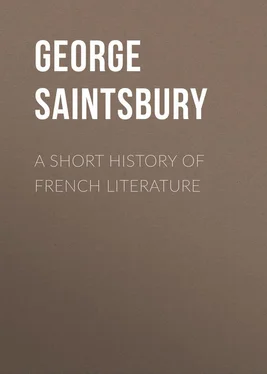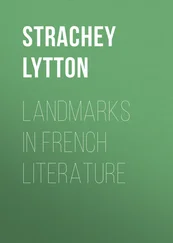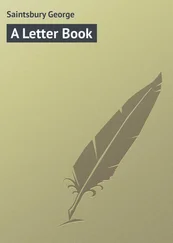George Saintsbury - A Short History of French Literature
Здесь есть возможность читать онлайн «George Saintsbury - A Short History of French Literature» — ознакомительный отрывок электронной книги совершенно бесплатно, а после прочтения отрывка купить полную версию. В некоторых случаях можно слушать аудио, скачать через торрент в формате fb2 и присутствует краткое содержание. ISBN: , Жанр: foreign_prose, на английском языке. Описание произведения, (предисловие) а так же отзывы посетителей доступны на портале библиотеки ЛибКат.
- Название:A Short History of French Literature
- Автор:
- Жанр:
- Год:неизвестен
- ISBN:http://www.gutenberg.org/ebooks/33062
- Рейтинг книги:3 / 5. Голосов: 1
-
Избранное:Добавить в избранное
- Отзывы:
-
Ваша оценка:
- 60
- 1
- 2
- 3
- 4
- 5
A Short History of French Literature: краткое содержание, описание и аннотация
Предлагаем к чтению аннотацию, описание, краткое содержание или предисловие (зависит от того, что написал сам автор книги «A Short History of French Literature»). Если вы не нашли необходимую информацию о книге — напишите в комментариях, мы постараемся отыскать её.
A Short History of French Literature — читать онлайн ознакомительный отрывок
Ниже представлен текст книги, разбитый по страницам. Система сохранения места последней прочитанной страницы, позволяет с удобством читать онлайн бесплатно книгу «A Short History of French Literature», без необходимости каждый раз заново искать на чём Вы остановились. Поставьте закладку, и сможете в любой момент перейти на страницу, на которой закончили чтение.
Интервал:
Закладка:
Trouvères and Jongleurs.
It is however probable that the explanation of this phenomenon need not be sought further than in the circumstances of the composition and publication of these poems, circumstances which also had a very considerable influence on the whole course and character of early French literature. We know nothing of the rise or origin of the two classes of Trouveurs and Jongleurs . The former (which it is needless to say is the same word as Troubadour , and Trobador , and Trovatore ) is the term for the composing class, the latter for the performing one. But the separation was not sharp or absolute, and there are abundant instances of Trouvères 16 16 The older and in this case more usual form.
who performed their own works, and of Jongleurs who aspired to the glories if not of original authorship, at any rate of alteration and revision of the legends they sang or recited. The natural consequence of this irregular form of publication was a good deal of repetition in the works published. Different versions of the legends easily enough got mixed together by the copyist, who it must be remembered was frequently a mere mechanical reproducer, and neither Trouvère nor Jongleur; nor should it be forgotten that, so long as recitation was general, repetitions of this kind were almost inevitable as a rest to the reciter's memory, and were scarcely likely to attract unfavourable remark or criticism from the audience. We may therefore conclude, without entering further into the details of a debate unsuitable to the plan of this history, that, while but scanty evidence has been shown of the existence previous to the Chansons de Gestes of a ballad literature identical in subject with those compositions, at the same time the existence of such a literature is neither impossible nor improbable. It is otherwise with the hypothesis of the existence of prose chronicles, from which the early epics (and Roland in particular) are also held to have derived their origin. But this subject will be better handled when we come to treat of the beginnings of French prose. For the present it is sufficient to say that, with the exception of the scattered fragments already commented upon, there is no department of French literature before the eleventh century and the Chansons de Gestes , which possesses historical existence proved by actual monuments, and thus demands or deserves treatment here.
CHAPTER II
THE CHANSONS DE GESTES
The earliest form which finished literature took in France was that of epic or narrative poetry. Towards the middle of the eleventh century certainly, and probably some half-century earlier, poems of regular construction and considerable length began to be written. These are the Chansons de Gestes , so called from their dealing with the Gestes 17 17 Gesta or Geste has three senses: ( a ) the deeds of a hero; ( b ) the chronicle of those deeds; and ( c ) the family which that chronicle illustrates. The three chief gestes are those of the King, of Doon de Mayence, and of Garin de Montglane. Each of these is composed of many poems. Contrasted with these are the 'petites gestes,' which include only a few Chansons.
, or heroic families of legendary or historical France. It is remarkable that this class of composition, notwithstanding its age, its merits, and the abundant examples of it which have been preserved, was one of the latest to receive recognition in modern times. The matter of many of the Chansons, under their later form of verse or prose romances of chivalry, was indeed more or less known in the eighteenth century. But an appreciation of their real age, value, and interest has been the reward of the literary investigations of our own time. It was not till 1837 that the oldest and the most remarkable of them was first edited from the manuscript found in the Bodleian Library 18 18 La Chanson de Roland , ed. Fr. Michel, Paris, 1837. The MS. is in the Bodleian Library (Digby 23). Another, of much later date in point of writing but representing the same text, exists at Venice. Of later versions there are six manuscripts extant. The Chanson de Roland has since its editio princeps been repeatedly re-edited, translated, and commented. The most exact edition is that of Prof. Stengel, Heilbronn, 1878, who has given the Bodleian Manuscript both in print and in photographic facsimile. The best for general use is that of Léon Gautier (seventh edition), 1877.
. Since that time investigation has been constant and fruitful, and there are now more than one hundred of these interesting poems known.
Origin of Chansons de Gestes.
The origin and sources of the Chansons de Gestes have been made a matter of much controversy. We have already seen how, from the testimony of historians and the existence of a few fragments, it appears that rude lays or ballads in the different vernacular tongues of the country were composed and sung if not written down at very early dates. According to one theory, we are to look for the origin of the long and regular epics of the eleventh and subsequent centuries in these rude compositions, first produced independently, then strung together, and lastly subjected to some process of editing and union. It has been sought to find proof of this in the frequent repetitions which take place in the Chansons, and which sometimes amount to the telling of the same incident over and over again in slightly varying words. Others have seen in this peculiarity only a result of improvisation in the first place, and unskilful or at least uncritical copying in the second. This, however, is a question rather interesting than important. What is certain is that no literary source of the Chansons is now actually in existence, and that we have no authentic information as to any such originals. At a certain period – approximately given above – the fashion of narrative poems on the great scale seems to have arisen in France. It spread rapidly, and was eagerly copied by other nations.
Definition.
The definition of a Chanson de Geste is as follows. It is a narrative poem, dealing with a subject connected with French history, written in verses of ten or twelve syllables, which verses are arranged in stanzas of arbitrary length, each stanza possessing a distinguishing assonance or rhyme in the last syllable of each line. The assonance, which is characteristic of the earlier Chansons, is an imperfect rhyme, in which identity of vowel sound is all that is necessary. Thus traitor , felon , compaingnons , manons , noz , the first, fourth, and fifth of which have no character of rhyme whatever in modern poetry, are sufficient terminations for an assonanced poem, because the last vowel sound, o, is identical. There is moreover in this versification a regular caesura, sometimes after the fourth, sometimes after the sixth syllable; and in a few of the older examples the stanzas, or as they are sometimes called laisses , terminate in a shorter line than usual, which is not assonanced. This metrical system, it will be observed, is of a fairly elaborate character, a character which has been used as an argument by those who insist on the existence of a body of ballad literature anterior to the Chansons. We shall see in the following chapters how this double definition of a Chanson de Geste , by matter and by form, serves to exclude from the title other important and interesting classes of compositions slightly later in date.
Period of Composition.
The period of composition of these poems extended, speaking roughly, over three centuries. In the eleventh they began, but the beginnings are represented only by Roland , the Voyage de Charlemagne , and perhaps Le Roi Louis . Most and nearly all the best date from the twelfth. The thirteenth century also produces them in great numbers, but by this time a sensible change has come over their manner, and after the beginning of the fourteenth only a few pieces deserving the title are written. They then undergo transformation rather than neglect, and we shall meet them at a later period in other forms. Before dealing with other general characteristics of the early epics of France it will be well to give some notion of them by actual selection and narrative. For this purpose we shall take two Chansons typical of two out of the three stages through which they passed. Roland will serve as a sample of the earliest, Amis et Amiles of the second. Of the third, as less characteristic in itself and less marked by uniform features, it will be sufficient to give some account when we come to the compositions which chiefly influenced it, namely the romances of Arthur and of antiquity.
Читать дальшеИнтервал:
Закладка:
Похожие книги на «A Short History of French Literature»
Представляем Вашему вниманию похожие книги на «A Short History of French Literature» списком для выбора. Мы отобрали схожую по названию и смыслу литературу в надежде предоставить читателям больше вариантов отыскать новые, интересные, ещё непрочитанные произведения.
Обсуждение, отзывы о книге «A Short History of French Literature» и просто собственные мнения читателей. Оставьте ваши комментарии, напишите, что Вы думаете о произведении, его смысле или главных героях. Укажите что конкретно понравилось, а что нет, и почему Вы так считаете.












